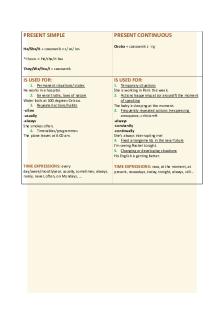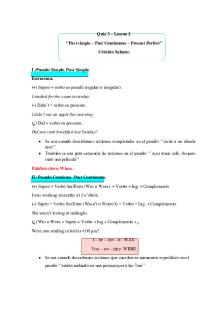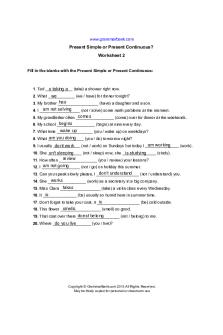Apuntes B1 - Bloque 1 - Grammar: Present continuous, present simple, past simple, past continuous, PDF

| Title | Apuntes B1 - Bloque 1 - Grammar: Present continuous, present simple, past simple, past continuous, |
|---|---|
| Author | Paco Balbuena |
| Course | English course |
| Institution | Universitat de València |
| Pages | 31 |
| File Size | 1.5 MB |
| File Type | |
| Total Views | 178 |
Summary
Grammar: Present continuous, present simple, past simple, past continuous, present perfect, present perfect continuous. Vocabulary: country, nationality and language; the physical world, weather, animals and insects, the body and movement, describing appearance...
Description
GRAMMAR AND VOCABULARY IN USE Block 1 UNIT
GRAMMAR
VOCABULARY
1
Present continuous
Learning vocabulary
2
Present simple
Keeping a vocabulary notebook
3 4
Present continuous & Present simple 1 Present continuous & Present simple 2
Using a dictionary English language words
5
Past simple
Country, nationality & language
6
Past continuous
The physical world
7
Present perfect 1
Weather
8
Present perfect 2
Animals & insects
9
Present perfect continuous
The body and movement
10
Present perfect continuous & simple
Describing appearance
1
UNIT 1
GRAMMAR in use intermediate – Present continuous I
am
He / she / it
Verb -ing
is
We / you / they
driving
are
working, etc.
1.- I am doing something = I’m in the middle of doing it. I’ve started doing it and I haven’t finished. staar-thud
fi-nusht
Please don’t make so much noise. I’m trying to work. (not I try) ‘Where’s Mark?’ ‘He’s having a shower.’ What’s all that noise? What’s going on? Let’s go out now. It isn’t raining any more. (at a party) Hi Jane! Are you enjoying the party? (not Dou you enjoy…)
Started
/staar-thud/
Any more = cantidad (nada más)
Finished
/fi-nuhst/
Anymore = nunca más
What’s going on? = What’s happening?
2.- Sometimes the action is not happening at the time of speaking:
Steve is talking to a friend on the phone. He says: I’m reading a really good book at the moment.
Steve is not reading the book at the time of speaking. He means that he has started it, but has not finish it yet. He’s in the middle of reading it
3.- You can use the present continuous with today / this week / this year / etc. (periods around now).
You are working hard today. The company I work for isn’t doing so well this year.
Work for (sb/sth)= trabajar para
4.- We use the present continuous when we talk about changes happening around now, especially with chain-juhz the verbs:
GET
CHANGE tʃeɪndʒ
BECOME
INCREASE
RISE
FALL
GROW
IMPROVE
BEGIN START bi - gin
ɪn-kriːs
2
VOCABULARY in use pre-intermediate and intermediate – Learning vocabulary
Routine (something you do often and usually in the same way)
Routine
/ruːˈtiːn/
Weekly routine
Often
/ˈɒfən/
Daily routine
Answer
/ˈɑːnsər/
At least (not less than) Over to you = sobre ti
1.1.- Over to you. Write your answers. 1. How often can you spend at least half an hour or forty-five minutes on a unit? I study English almost every day for half an hour at least. 2. How often can you revise? How much time can you spend when you revise? Where will you do it? I can revise five days a week, from Monday to Friday. I can spend twenty minutes those days at the lunch time.
Say it aloud (speaking so you can hear it)
Aloud
/əˈlaʊd/
Highlighter pen = subrayador
Highlighter pen
Hear
/ˈhɪər/
Write down = anotar
Write down
Highlighter
/ˈhaɪlaɪtər/
Rub out = borrar
Rub out
Rub
/ˈrʌb/
Rubber = goma de borrar
Rubber
Rubber
/ˈrʌbər/
1.2.- Over to you. Write your answers: 1. Which of these things do you do now when you are learning vocabulary? I do it almost everything except once
one
. I don’t usually write a sentence as an example.
2. What will you do in the future? I’ll write a sentence when I look for a word in a dictionary.
Synonyms (syn)
Synonym
/ˈsɪnənɪm/
Partner = compañero, pareja
Opposites (opp)
Opposite
/ˈɒpəzɪt/
Look up = buscar
3
Synonyms of look up:
Opposites of look up:
Find out
Find out = averiguar
Give up
Give up = desistir
Investigate
Investigate = investigar
Abandon
Abandon = abandonar
research
Research = investigar
Desert
Desert = abandoner, dejar
surrender
Surrender = abandonarse a
Abandon
/əˈbændən/
Abandoned
/əˈbændənd/
Desert
/ˈdɛzərt/
Deserted
/dɪˈzɜːrtɪd/
Surrender
/səˈrɛndər/
Surrender
suh·ren·duhd
Research
/rɪˈsɜːrtʃ/
Researched
/rɪˈsɜːrtʃt/
What does this English word mean? No clue. I’ll have to look it up in the dictionary. They soon found out the flower shop was a front. My friend doesn’t trust his bussines partner, and hired a detective to investigate him. I’m going to research how students can improve their pronunciation. She gave up university in the second year. Front = tapadera Esteban abandoned his family for a woman he met in another city. Hire = alquilar, contratar My father deserted us when I was a child. Stop firing! We surrender!
1.4. Find opposites for the words:
Permanent
Entrance
temporary
temporal
Transient
pasajero
Variable
variable
Fleeting
fugaz
Temporal
temporal
Uncertain
inestable
/ˈtrænziənt/
/ˈfliːtɪŋ/
/ʌnˈsɜːrtən/
exit Escape Way out
4
Kind
evil
malvado
Mean
malo
Nasty
malo
Unkind
poco amable
Horrible
horrible
Rough
brusco
/ˈrʌf/
Rude
maleducado
/ˈruːd/
Ruthless
despiadado
Violent
violento
/ˈvaɪələnt/
Wicked
malvado
/ˈwɪkɪd/
Smooth
coarse
áspero
/ˈkɔːrs/
liso
Rough
áspero
/ˈrʌf/
Gritty
arenoso
/ˈgrɪti/
Lumpy
lleno de bultos
/ˈlʌmpi/
decline
declinar
Refuse
rechazar
Accept
VERB Argue Revise Choose Expand Differ Communicate
/ˈnɑːsti/
NOUN Argument Revision Choice Expansion Difference Communication
5
ADJECTIVE
Different Communicative
UNIT 2
GRAMMAR in use intermediate – Present simple
I / we / you / they
Drive / work / do…
He / she / it
Drives / works / does…
2.1.- We use the present simple to talk about things in general. We use it to say that something happens all the time or repeteadly, or that something is true in general.
Nurses look after patients in hospital. The earth goes round the sun.
2.2.- We use do/does to make questions and negative sentences:
Sentences
sen·tuhn·suhz
Do
I / we / you / they
work?
I / we / you / they
don’t work
Does
he / she / it
work?
He / she / it
doesn’t work
I don’t go away very often. What does this word mean?
In the following examples, do is also the main verb:
What do you do? I work in a shop. He’s always so lazy. He doesn’t do anything to help.
2.3.- We use the present simple to say how often we do things (every morning, very often, two times a year…)
Julie doesn’t drink tea very often. How often do you go to the dentist?
2.4.- I promise / I apologize / etc.
I promise I won’t be late. What do you suggest I do? I suggest that you…
Promise
/ˈprɒmɪs/
Agree
/əˈgriː/
In the same way we say: I apologise… / I advise… / I insist… / I agree… / I refuse… /etc.
6
VOCABULARY in use pre-intermediate and intermediate – Keeping a vocabulary notebook
This is what some students do Write down
Write down
Note down
Note down
Make a note of
Make a note of
Translation
And so on
etcétera
Phonemics
I try and list
trato de enumerar
Topic
tema / asunto
anotar
Mess Topic Translate into
I write down new English words. I write English translation. I usually note down if a word is a noun, verb, adjective, and so on. I sometimes make a note of new words in my notebook. I try and list words by topic. Sometimes I translate new words into Polish.
Tips for your notebook Tip (piece of advice)
Tip
consejo
Uncountable
/ʌnˈkaʊntəbəl/
Mix up (put together with no order)
Mix up
mezclar
Phrase
/ˈfreɪz/
Grammar topics
Go on
seguir, continuar, colocar
Awful
/ˈɔːfʊl/
Dreadful
/ˈdrɛdfʊl/
Also
/ˈɔːlsəʊ/
(un) Countable nouns Synonyms Opposites
Awful
terrible
Dreadful
terrible, espantoso
A tip is a piece of advice to help you. Don’t mix words up. Some words will go on in more than one topic. A tip is also money that you give, for example, to a waiter.
7
FOOD Diet Lay the table Flour Raw Frozen
GARDEN Branch Dig Ground Leaf Butterfly
NUMBERS Count Add up Minus Thousand zero
Lay the table
Poner la mesa
Diet
/ˈdaɪət/
Branch
rama (de árbol)
Flour
/ˈflaʊər/
Leaf
hoja
Leaf
/ˈliːf/
Add up
sumar
Minus
/ˈmaɪnəs/
Raw
crudo
Raw
/ˈrɔː/
Extra vocabulary
Cap
tapa, tapón
Syllable
/ˈsɪləbəl/
On its own
por su cuenta
Dialogue
/ˈdaɪəlɒg/
Target
objetivo
There
/ˈðɛər/
Aim
objetivo, apuntar
Here
/ˈhɪər/
Mad
enfadado, loco
Pan
sarten
Ham
jamón
Nail
clavo
Tap
grifo
I’m off
me voy
How are you getting there? = ¿Cómo vas a llegar? I’m a bit short of cash = Estoy un poco corto de dinero. When do you get back? When will you be back?
¿Cuándo vuelves?
When do you come back?
8
UNIT 3
GRAMMAR in use intermediate – Present continuous and present simple
Present continuous
Present simple
We use the continuous for things happening at or around the time of speaking. The action is not complete.
We use the simple for things in general or things that happen repeatedly. …..
___________________I am doing________________
_____________________I do___________________
PAST
PAST
PRESENT
FUTURE
The water is boiling. Can you turn it off? I’m getting hungry. Let’s go and eat. The population in the world is increasing very fast.
We use the continuous for temporary situations:
PRESENT
Water boils at hundred degrees Celsius. I always get hungry in the afternoon. Every day the population in the world increases by about 200.000 people.
We use the simple for permanent situations:
I’m living with some friends until I find a place of my own.
My parents live in London. They have lived there all their lives.
I’m always doing (something)
I always do (something) = I do it every time.
FUTURE
Has a different meaning.
I always go to work by car.
I’ve lost my phone again. I’m always losing things. ( I lose things very often, perhaps too often, or more often than normal) Tim is never satisfied. He’s always complaining.
Boil
/ˈbɔɪl/
Boil
hervir
Celsius
/ˈsɛlsɪəs/
Of my own
propio
Increasing
/ɪnˈkriːsɪŋ/
Complaining
quejarse, quejas.
Lived
/livd/
Lives
/ˈlaɪvz/
There
/ˈðɛər/
Satisfied
/ˈsætɪsfaɪd/
9
You’re always complaining. I don’t want to hear any more of your complaining.
Correct
/kəˈrɛkt/
Useless
inútil, inservible
Must
/ˈmʌst/
Get on
subir, llevarse bien, llevar
Just
/ˈdʒʌst/
Occasionally
/əˈkeɪʒənəli/
Nile
/ˈnaɪl/
Mediterranean
/ˌmɛdɪtəˈreɪniən/
Hear
/ˈhɪər/
Here
/ˈhɪər/
There
/ˈðɛər/
That car is useless. It’s always breaking down. How are you getting on?
VOCABULARY in use preintermediate and intermediate – Using a dictionary
3.1.- Information in dictionaries.
Pronunciation using phonemic symbols. Part of speech (=noun…) A definition explains the meaning. Fixed phrases using the word are shown in bold. [C] and [U] tells you that word is countable or uncountable. Bold italics show common word partners.
3.2.- Defining words.
Defining words are words that dictionaries use when they define (explain) the words in the dictionary. Some of these are quite common.
Emphasise (give something more attention and importance). Relating to or connected to/with (having a relationship with someone or something). Amount (how much there is of something). Official (done by the government or someone in authority). Behave (do or say things in a particular way).
Definition
/ˌdɛfɪˈnɪʃən/
Bilingual
/ˌbaɪˈlɪŋgwəl/
Emphasise
/ˈɛmfəsaɪz/
Practice
/ˈpræktɪs/
Amount
/əˈmaʊnt/
Level
/ˈlɛvəl/
Available
/əˈveɪləbəl/
10
UNIT 4
GRAMMAR in use intermediate. Present continuous and present simple.
The following verbs are not normally used in the continuous: LIKE KNOW
REALISE
WANT NEED
SUPPOSE
BELONG
MEAN
FIT
PREFER
UNDERSTAND
CONTAIN
CONSIST
BELIEVE SEEM
darse cuenta
Mean
significar
Belong
pertenecer
Fit
quedar bien
Give up
abandonar, dejar
Think = believe or have an opinion Think = consider
not use continuous.
continuous is possible.
What do you think of my plan? Nicky is thinking of giving up her job (=she is considering it)
SEE
HEAR
SMELL
TASTE
Normally in present simple
Do you see that man over there? (not are you seeing)
We often use can + see / hear / smell / taste.
/ˈrɪəlaɪz/
Realise
Realise
REMEMBER
I can hear a strange noise. Can you hear it?
11
LOOK
FEEL
continuous or simple
You look well today. / You are looking well today. How do you feel now? / How are you feeling now?
I usually feel tired in the morning. (not I’m usually feeling)
But
He is… (generally) He is being… (at the moment)
I can’t undertand why he’s being so selfish. He isn’t usually like that. He never thinks about other people. He is very selfish.
Selfish = egoista
We use am / is / are being to say how somebody is behaving. It is not usually possible in other sentences. Behaving = comportarse It’s hot today. (not it is being hot)
Nitrogen
/ˈnaɪtrədʒən/
Oxygen
/ˈɒksɪdʒən/
There
/ˈðɛər/
They’re
/ˈðɛər/, /ˈðeɪər/, /ðər/
Unreasonable
/ʌnˈriːzənəbəl/
12
VOCABULARY in use preintermediate & intermediate – English language words. Speech = discurso, habla
4.1.- Parts of speech.
Leather = cuero
Pronoun
I have a brown leather chair by the window, and I often sit there in the morning to read the paper.
Noun Verbs Adjectives Adverb Preposition Article
Pronoun: I Nouns: chair, window, morning and paper. Verbs: have, sit and read. Adjectives: brown and leather. Adverbs: often. Preposition: by Article: the (definite article). Conjuntion or link word: and.
Conjunction or link word
13
Language
/ˈlæŋgwɪdʒ/
Leather
/ˈlɛðər/
Definite
/ˈdɛfɪnɪt/
Article
/ˈɑːrtɪkəl/
4.2.- Grammar
Nouns countable (books, apples, chairs) Uncountable (information, advice)
Verbs regular (walk/walked, work/worked) Irregular (go/went, take/took)
Phrasal verbs (wake up, take something off)
Countable
/ˈkaʊntəbəl/
Regular
/ˈrɛgjʊlər/
Irregular
/ɪˈrɛgjʊlər/
Phrasal
/ˈfreɪzəl/
Walked
/wawkt/
Worked
/workt/
Phrases (at the moment, never mind, see you later)
4.3.- Word building Prefix /ˈpriːfɪks/
Prefixis
/’pri:fikshuz/
Suffi...
Similar Free PDFs
Popular Institutions
- Tinajero National High School - Annex
- Politeknik Caltex Riau
- Yokohama City University
- SGT University
- University of Al-Qadisiyah
- Divine Word College of Vigan
- Techniek College Rotterdam
- Universidade de Santiago
- Universiti Teknologi MARA Cawangan Johor Kampus Pasir Gudang
- Poltekkes Kemenkes Yogyakarta
- Baguio City National High School
- Colegio san marcos
- preparatoria uno
- Centro de Bachillerato Tecnológico Industrial y de Servicios No. 107
- Dalian Maritime University
- Quang Trung Secondary School
- Colegio Tecnológico en Informática
- Corporación Regional de Educación Superior
- Grupo CEDVA
- Dar Al Uloom University
- Centro de Estudios Preuniversitarios de la Universidad Nacional de Ingeniería
- 上智大学
- Aakash International School, Nuna Majara
- San Felipe Neri Catholic School
- Kang Chiao International School - New Taipei City
- Misamis Occidental National High School
- Institución Educativa Escuela Normal Juan Ladrilleros
- Kolehiyo ng Pantukan
- Batanes State College
- Instituto Continental
- Sekolah Menengah Kejuruan Kesehatan Kaltara (Tarakan)
- Colegio de La Inmaculada Concepcion - Cebu















